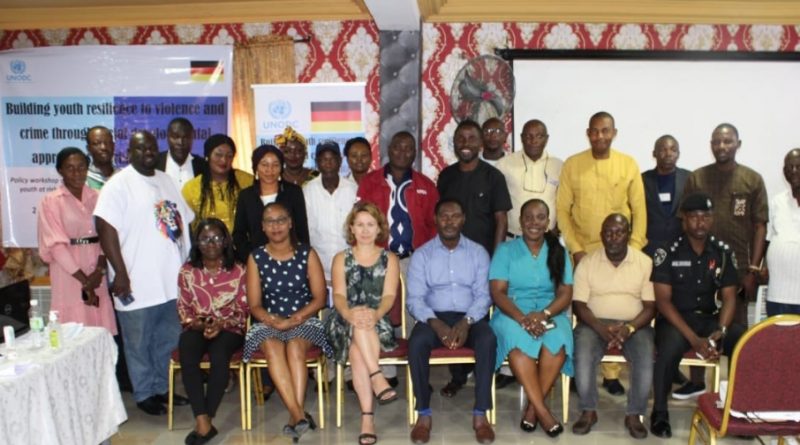Building youth resilience to violence and crime through social developmental approaches to crime prevention
ORU Leonard
Nigeria’s youthful population, particularly in the Niger Delta region, are facing multiple challenges that include low level and quality of education and health care, poverty, and unemployment, which makes them more vulnerable to drug use, gang violence, cultism, piracy, riverine and other maritime crimes, all of which are prevalent in the Niger Delta region and are adversely affecting the life and safety of young people as well as the local communities and pose security risks.
It is against this backdrop that the United Nations Office on Drug and Crime, through its crime prevention project, titled “Combating Piracy and other Maritime Insecurity using community-based strategies” in the Niger Delta and working in close partnership with the Government of Bayelsa State has supported the development of the Crime Prevention strategy for Bayelsa State and is building local capacity to effectively address violence and crime at the community level, including through social developmental approaches that engage at-risk youth.
To this end, UNODC organized a policy workshop on “Building youth resilience to violence and crime through social developmental approaches to crime prevention” explored risk and protective factors on youth violence and crime and shared good practices on effective prevention approaches. The workshop brought together over 20 stakeholders from the Bayelsa State Government, including representatives of the Ministry of Youth and Sport, Bayelsa State Council for Arts and Culture and Ministry of Women Children Affairs, Empowerment and Social Development as well as the law enforcement sector, civil society organizations and representatives of the three local pilot beneficiary communities, namely Ayamasa, Ikebiri 1 and Otuan. Discussions throughout the workshop were centred in particular on understanding risk and protective factors to youth violence and crime and effective approaches as per international standards and norms; learning on evidence-based prevention interventions and sharing good practices, including informal education, life skills training and youth mentoring programmes, family support and positive parenting and sport-based interventions in building youth and local resilience to violence and crime, and exploring the role of art and culture as vehicles for youth engagement and empowerment.
Participants also learned about effective approaches for supporting the reintegration of young people in contact with the law and preventing recidivism of young offenders as well as exploring the role of law enforcement and the criminal justice system in this regard. The workshop closed with a session dedicated to the importance of data and comprehensive monitoring & evaluation systems, as well as ways to effectively engage youth and local communities on impact assessment and evaluation studies.
Participants were actively engaged throughout the workshop and demonstrated great enthusiasm in showcasing examples, and exploring challenges and opportunities for effective youth crime prevention in the Nigerian context. Representing the 3 pilot communities of Ayamasa, Ikebiri 1 and Otuan, Chief Victor Preebi Bob from Otuan Community, commented that” the workshop was very impactful and eye opening” and increased their understanding and knowledge of effective prevention, whilst many participants described it as “very informative” appreciating the opportunity to share best practices, exchange experiences and perspectives with the group.
The highlight of the workshop focused on the piloting of the UNODC Line Up Live Up, sport-based life skills training programme, at three selected communities, targeting at-risk youth in school and community settings, consulting with participants on the design and implementation of the local interventions, to ensure proper contextualization. Community representatives are committed to ensuring that the programme is implemented successfully and that the youth in their communities benefit from active participation.
UNODC will further support local efforts to effectively prevent crime through the delivery of a Training of Trainers on the Line Up Live Up curriculum and methodology and provision of sports equipment to facilitate implementation and training of young people in Ayamasa, Ikebiri 1 and Otuan communities.
(UNODC Media)




